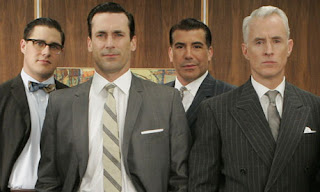First things first, I want to give credit to Hemant Mehta who originally posted on the Rebecca Watson/sexual harassment/privilege dispute in a way that ticked a lot of feminists off. Yesterday he clarified and reflected, and I appreciate his patience and willingness to listen when people tried to argue respectfully. Here’s part of what he wrote that I think is especially good:
Some people (mostly men) have said the elevator incident wasn’t a big deal. Here’s what you may not understand (and I don’t think I connected the dots until now):
I’ve been to dozens of atheists conferences over the past several years. At just about every one of them, the men have vastly outnumbered the women. As a result, the women become something of a competition for the men. Who can hit on them? Who can sleep with them? Obviously, not all the guys do this and we don’t even talk about it, but enough of them do what Elevator Guy did that the women have basically come to expect it. (And then we wonder why it’s so hard to get them to attend atheist gatherings.)
How do I know this? Because I’ve been around the women who are subject to this treatment. They talk about it. They talk about the “Old Boys’ Network” atmosphere that permeates not only our conferences, but also some organizations and their boards. Sometimes, they’re hit on, and other times, they’re excluded from important conversations and prevented from holding positions of higher authority. It’s a serious problem for us. It doesn’t just apply to one “type” of woman, either.
Paradoxically, I think the way we fix this is by getting more women involved in our movement. But we’re pushing them away by treating Elevator-like incidents as if they’re not representative of a larger problem. All of us need to call those incidents out when they happen and educate the people who don’t know better.
He’s bang on target. Some people have been asking why focus on cleaning house among atheists when we might have bigger problem with religion or (if you’re Richard Dawkins) asking why we should ever worry about sexual harassment in the US when female genital mutilation exists abroad. Part of the answer is easy: this is the fight that’s right in front of us, and, because we know people/meet them/have personal clout, there are resources we have here as a member of the group we’re trying to change, and we should make use of them.
The other reason we should act here is exactly because activist atheism is currently a male-heavy group, and, before it calcifies, we need to try to make space for women so that toxic and dangerous norms don’t get rooted. Groups dominated by men can be awkward or harmful environments for women in part because we’re so much more visible as that woman than we are when the gender balance is closer to even. That’s not a pitch for a quota, but it’s a reminder that there are dangers we need to watch out for when the gender ratio is unbalanced. We need to think about the ways that a male-dominated group can self-perpetuate as male-dominated, even when the guys involved aren’t making an conscious effort to exclude women, as long as they’re ignorant of the ways they’re intimidating or shutting people out.
I want to share a personal experience with this kind of problem below, so let me throw in the caveat that the plural of anecdote is not data, and I’m using this as a general example of this phenomena, not as an analogy for the elevator incident or the atheist movement’s problems with gender broadly.
When I was in high school, my mathlete team won a slot at the state competition. The top three teams from my region took a bus up together, and it turned out I was the only girl on any of the teams on the bus. I wasn’t close friends with any of the guys on my team, and I wouldn’t assume they liked me, but they’d never really gone after me or really had a problem with me.
On the bus, on the way to our hotel, they started making jokes about breaking into my room that night and raping me.
They found this hilarious, but once we got to the hotel, they didn’t bother me or repeat the threat off the bus, and in the rest of the time I went to school with them, I never had an experience like that again. It seemed to be an artifact of being away from our usual haunts, on a special trip, with my femaleness registering as more jarring than it ever had been before. (And no, I didn’t report it to our teacher chaperone (who I though of as extremely passive). I know now I should have, but in the moment, I felt like I had a responsibility not to let them get a rise out of me. I was team captain, and I thought I couldn’t do something that would disrupt our dynamic or cause them to lose respect for me).
There were plenty of times when people we’re mean to me in high school (par for the course), but, to the best of my recollection, people only picked on me as a girl in gender unbalanced situations. The mathelete bus ride was the worst of it, thankfully, but there were other minor incidents. For my entire senior year, my guy-dominated AP Computer Science class made fun of my chest after I made the mistake of wearing a non-baggy shirt to school (I was a very conservative dresser —I’m leaving this paranthetical because it’s just depressing that while I was writing this I felt compelled to defend myself from the accusation I provoked them). They punctuated any reference to size, position, etc with the cry “Just like Leah’s breasts!” frequently right in front of the teacher and they never got in trouble.
For whatever reason, they behaved better when there were more women around. I could be very cynical and say they just covered up their intrinsic-to-them bad behavior when there were enough of us around, but I don’t think that’s true. I just think that they were worse at thinking when women looked like anomalies. For their sake as much as mine, we should avoid fostering environments that inculcate those attitudes.
To break the cycle, we have to complain about “just us guys” bad behavior. That’s why I’m glad Rebecca Watson spoke up and I’m grateful that Jen keeps up the list of awesome women atheists, so conference organizers have no excuse for why there aren’t any women on their keynote lists.
It’s hard for isolated women in all guy groups to feel comfortable speaking up and making demands, when we’re already trying to be model women who never give offense or stir up resentment because we think we have to serve as a guarantor for all future female members. Luckily, the atheist community has enough respected women that we can get platforms to talk and push for reform. We’re strong enough to recruit, now we just need more allies.














